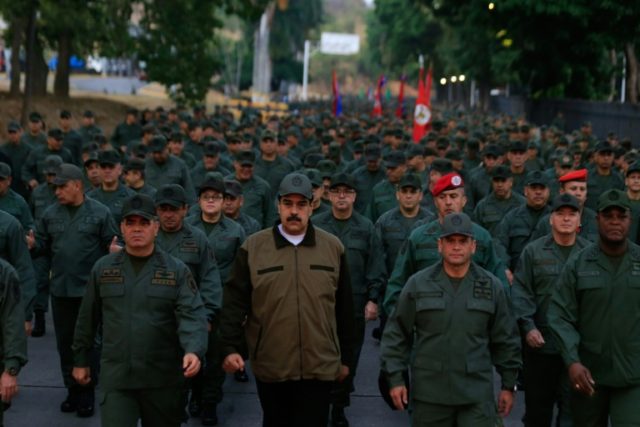A bishop in western Táchira, Venezuela, denounced socialist dictator Nicolás Maduro’s national guard troops this week, accusing them of interrupting a Catholic Eucharist service by driving their motorcycles into a church and releasing tear gas, injuring several worshippers.
The incident reportedly occurred on Wednesday, a day after Venezuelan President Juan Guaidó announced that, after nearly four months in office, the nation’s military had agreed to stop taking orders from Maduro and accept Guaidó as their commander in chief. As of Friday, Maduro appears to retain control of the military; Guaidó has repeatedly urged civilians to take to the streets and pressure him to leave.
The Bishop of San Cristóbal, the capital of Táchira, Mario Moronta, published a statement Wednesday denouncing the attack, asserting that a significant number of those attending the Mass were elderly persons poor equipped to withstand a military ambush. There is no evidence the Christians were assembling to protest Maduro or support Guaidó, though Táchira has historically been an opposition stronghold.
“This evening, a horde of National Bolivarian Guard (GNB) [soldiers] attacked the temple of Our Lady of Fátima,” Monsignor Mario Moronta wrote. Several soldiers tried to drive their motorcycles into the church, he alleged, until the rector of the church stopped them. “A general with the last name Ochoa … began arguing with the rector in disrespectful terms. Not satisfied with the ambush, the guards threw tear gas bombs into the temple.”
Moronta wrote that he managed to evacuate the church, “where there were a good number of believers, and among them plenty of elderly people.” One woman fainted, he noted.
The bishop directly blamed the general who entered the church for the “attack against the Catholic Church” generally, not just his church, and accused the assailants of not having “even the slightest bit of human dignity or showing even fear of God.”
Venezuelan journalists shared footage of the attack on social media that showed tear gas coming out of the church and the building surrounded by soldiers on motorcycles.
Video de ataque de la #GNB en Táchira a la iglesia de Nuestra Sra de Fátima..#1May#1May https://t.co/2YU5Fr6noF
— Leonardo León (@leoperiodista) May 2, 2019
The Christian outlet Aleteia notes that Monsignor Moronta has faced repression from Maduro’s socialist regime repeatedly in the past. Maduro’s police have blocked him from two churches where he was scheduled to attend Mass and prevented him from visiting a prison during Holy Week this year and offering religious services to inmates.
Maduro has for years targeted Catholic leaders will repression, as Venezuela’s clergy have repeatedly demanded he stop using violence against peaceful protesters and step down to allow a legitimate government to take hold. In 2017, pro-Maduro gangs (colectivos) attacked Caracas’s San Pedro Claver Church, interrupting a Mass and forcing those congregated to instead listen to a socialist rant praising Maduro and late dictator Hugo Chávez.
Monsignor Diego Padrón, the head of the Venezuelan Episcopal Conference, condemned Maduro’s government for “premeditated events meant to intimidate the Catholic Church,” noting that the Caracas incident was the latest in a series of similar attacks.

COMMENTS
Please let us know if you're having issues with commenting.